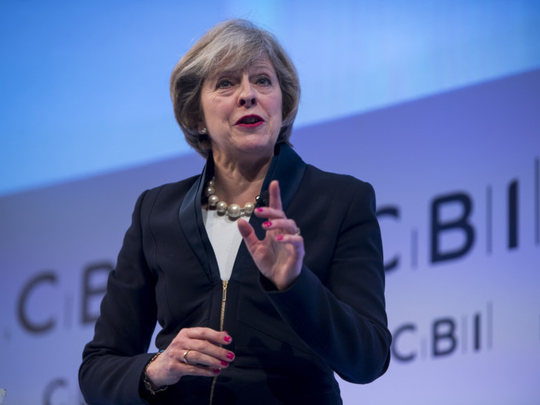
LONDON: UK Prime Minister Theresa May is getting ready for one of the most complex negotiations that she, or anyone, has ever faced.
To help her lead Britain out of the European Union, Bloomberg sought advice from veterans of other high-stakes talks.
They’ve freed hostages, brokered divorces, secured peace deals and poker pots, and their counsel has a common thread running through it: keep quiet. The prime minister needs to hold her cards close to her chest, keep her lieutenants in check and listen more than she talks, they said.
The experts’ suggestions might explain why May has been so tight-lipped since taking office in July. Whether she can hold that line, with European leaders and opposition lawmakers demanding she set out her plans as soon as possible, may shape how good a deal she can get for voters.
The Hostage Scenario
Former Policeman Richard Mullender persuaded the Taliban to free three United Nations workers it had captured in 2004 and has also helped liberate British citizens kidnapped abroad. He says that when trying to free a hostage, listening is often more important than talking. Only one person should speak to the perpetrator with the rest of the team providing guidance.
That may be easier said than done for May. She has packed her Cabinet with lawmakers such as Brexit Secretary David Davis who, unlike her, built their careers around leaving the EU and are agitating for a clear break, while Foreign Secretary Boris Johnson has already been reprimanded for going off message.
According to Mullender, it’s also important to keep emotions in check and focus on deciphering what makes the other party tick.
“The biggest secrets that people give away will come through the words they speak,” he said. “The key tip is really to shut up.”
Trade Talks
While ministers like Davis and Chancellor Philip Hammond have explained their priorities for the talks, May has given far less away so far. She should continue to keep as much detail of what she wants to herself, said David Archer, a headhunter at Circle Square Talent Ltd. who specialises in recruiting trade negotiators.
“With all negotiations, even if we look at a corporate negotiation, you always have to keep your cards close to your chest,” Archer said. “If you show everyone your cards, then you’ve lost the game.”
The premier should also use the power of her office sparingly, perhaps wading in only in the final stages of talks when difficult issues need resolving, according to Danny Burrows, a former Australian trade negotiator who now helps companies access Asia.
“You always want to have another level to go up to,” he said.
The Divorce Lawyer
One area where the prime minister has been clear is on the need to control immigration, and that set an early benchmark how far ties will have to be severed in other areas.
Establishing “reasonable” expectations of what can be achieved can lay the foundations for a good relationship after Brexit, according to Emma Hubbard, a family lawyer at Cartwright King Solicitors, just as in a marriage breakdown when children are involved.
“There’s no point asking for the earth if you’re not going to get it,” said Hubbard. “All you’re going to do is delay matters, make them costly and turn the relationship sour.”
The Peacemaker
When trying to mediate conflict, a sustainable outcome is only achieved when negotiators prioritise common interests over individual needs, according to Itonde Kakoma, head peace negotiator for sub-Saharan Africa at the Crisis Management Initiative. Kakoma worked alongside former US President Jimmy Carter on the South Sudan peace deal and now advises former Finnish President Martti Ahtisaar, who facilitated peace between Indonesia and Aceh.
For May, that means doing the best for the UK overall rather than just trying to appease the 52 per cent of Britons who voted for Brexit. He also advised her to ditch the sound bites such as “red, white and blue” Brexit that have typified the six months since the referendum and risk irritating her interlocutors.
The Poker Game
When poker player Chuck Clark sits down at the card table, he assesses the skill level of his rivals and that informs the way he plays a hand.
“Depending how much skill advantage you have over a particular opponent, you can sometimes afford to play weaker hands,” said Clark, who’s been a professional gambler for the seven years.
“You want to be either bluffing or have the winning hand,” he added. “You don’t want to play a strategy where you’re always bluffing because then opponents can counteract that strategy.”
One of the many ways that May’s job is tougher than Clark’s — the prime minister doesn’t have the option of throwing in her chips if she doesn’t like her cards.








